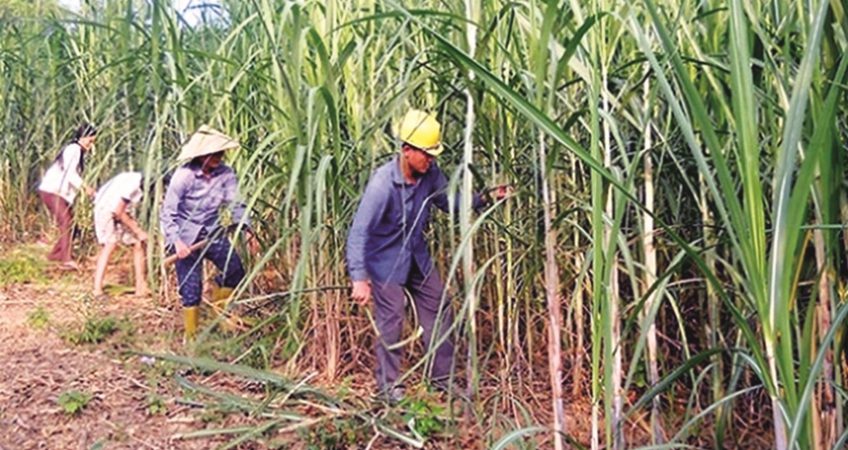
INITIATING WTO LAWSUIT AGAINST THAILAND’S EXPORT SUBSIDY ON SUGARCANE SUBSIDIES:“ĐÒN GIÓ BẺ MĂNG”?
INITIATING WTO LAWSUIT AGAINST THAILAND’S EXPORT SUBSIDY ON SUGARCANE SUBSIDIES:“ĐÒN GIÓ BẺ MĂNG”?
Dr.Le Thi Anh Nguyet *
Thailand government has implemented a variety of subsidies programs on its sugarcane to support the industry [1]. In response to the negative injuries from these subsidizes programs, Vietnam has also simultaneously imposed preliminary anti-dumping and countervailing duties, given that there is a possibility of infringing the double remedies,[2] in order to increase Thailand’s sugarcane prices in Vietnam market. However, these measures are still only the “top” solution. The article analyzes a possibility that need serious consideration to handle the “root” of Thailand’s unfair sugar price; that is, suing Thailand to the Dispute Settlement Body (“DSB“) of the World Trade Organization’s (“WTO“) for consultation, asking Thailand to cut and abolish export subsidies programs on sugarcane.
Thailand’s sugarcane subsidies: compatible with WTO or not?
According to the WTO, subsidy is a financial contribution by a government or any public body in the form of money transfers, loans, tax exemptions, supply of raw materials.[3] Accordingly, WTO members do not necessarily have to cut off all of the subsidies, financial support for businesses and their goods because up to now, depending on the different items and the level of development of WTO members that implementing the subsidies, the WTO applies corresponding obligations to eliminate and cut subsidies differently.
Specifically, for non-agricultural products, according to Agreement on Subsidies and Countervailing Measures of WTO (“SCM Agreement“) divides subsidy for industrial goods into the following 02 groups: (1) export subsidy and (2) domestic subsidy, not related to export. In particular, only for export subsidy, WTO members are prohibited the provision.
In contrast, for agricultural products, the WTO establishes a detailed WTO membership obligation in Agreement on Agriculture. Accordingly, WTO members are obliged to commit not exporting subsidy exceeding a certain levels, but WTO members are not obliged to completely abolish export subsidies for agricultural products (Article 3.2 and 3.3 of Agreement on Agriculture mentioned as: a Member shall not provide export subsidies…in excess of the budgetary outlay and quantity commitment levels specified therein and shall not provide such subsidies in respect of any agricultural product not specified in that Section of its Schedule). Thus, in theory, we can understand that Thailand is only entitled to export subsidies for sugarcane beyond the level of commitment in quantities and certain expenditure budget, not being obliged to eliminate subsidies for sugarcane completely.
Thailand – a respondent in WTO for sugarcane subsidies
For some WTO members, sugarcane is one of the “early staged developed”, “vulnerable” agricultural goods of many countries such as China, Brazil, Thailand, India, Australia, and the European Union (“EU“)[4]. The DSBof WTO has received complaint relating to these countries’ breach of export subsidy obligation in Agreement on Agriculture For example, Brazil, Australia, Thailand complained to the EU to the WTO (2006); Brazil sues India for violating sugarcane export subsidies (2019); Australia sues India for violating sugarcane export subsidies (2019); Guatemala sues India for violating sugarcane export subsidies (2019).
Particularly for Thailand, when it joined the WTO in 1995, Thailand did not specify the maximum expenditure budget for sugarcane export subsidies (in Section II of Part IV Of Schedule of Commitments). In other words, the maximum amount of export subsidies for sugarcane that Thailand can apply is 0 bath Thai. Therefore, if Thailand is found to subsidize any large or small amount of money for the production and export of sugarcane, it means that Thailand violates the obligation which has not provided export subsidies for sugarcane. Because of this, Brazil, in 2016, once argued that Thailand’s quota, price control system and subsidies for sugarcane producers are export subsidies for sugar in violation of Thailand’s obligations under the Agreement on Agriculture[5]. However, this case has so far not had a final result because the panel was not established, and without any dispute resolution recommendations issued by the DSB. As such, Vietnam has not been able to inherit any subsidy information from the past about the method and level how Thailand subsidizes sugarcane.
It should also be added that the Ministry of Industry and Trade of Vietnam, on February 9, 2021, issued Decision No. 447 simultaneously imposing anti-dumping duties and countervailing duties on imported sugarcane from Thailand. However, in fact that the sugar being imported from Thailand has not decreased and the damage to Vietnam’s sugar industry has not abolished accordingly[6].
In terms of WTO member obligations, when Vietnam has simultaneously applied both countervailing duties and anti-dumping duties on Thailand’s export sugarcane, we cannot generally say that Thailand’s sugarcane is price-support and subsidized because according to Article VI.5 of the 1994 GATT Agreement, Vietnam is obliged not to impose countervailing duties and anti-dumping duties on the same imports being affected by dumping or export subsidies. Therefore, in the long term to minimize the troubles from Thailand suing Vietnam to the WTO violatingArticle VI.5 of the 1994 GATT Agreement, we believe that Vietnam still needs to clearly clarify what kind of subsidies that government of Thailand apply to sugarcane enterprises and these kinds of subsidies that how benefits Thailand’s sugarcane producers receive and how much specifically. For example, Thai sugarcane is exported to Vietnam at 10,000VND/1 kg and Vietnam has discovered that 1 kg of Thailand’s sugarcane has received a corresponding subsidy of VND 5,000 (including export subsidy and domestic subsidy). Based on Agricultural on Agreement and the SCM Agreement, countervailing duties is not applicable to domestic subsidies and, therefore, Vietnam is not entitled to impose countervailing duties corresponding to VND 5,000/1 kg sugarcane of Thailand (Article 3.2 of the Agricultural on Agreement). Vietnam shall be obliged to determine how much export subsidies for sugarcane, assuming that in the export subsidies program in the form of reward because of sugarcane export achievements for sugarcane producers, Thailand spends 1,000VND/1 kg, Vietnam is only entitled to apply anti-dumping duties in the form of additional import tax of up to 1,000VND/1kg and this 1000VND/1kg will not be simultaneously applied tax and anti – dumping duties.
Meanwhile, according to current information, Vietnam has not yet determined the types of the subsidies programs that Thailand has applied to Thailand’s sugarcane producers subjecting to export subsidies or domestic subsidies and, level of the subsidies, if any, how much it is[7].
Sue Thailand’s export subsidies in WTO: Why not?
In the fact that domestic sugarcane goes through many hardships, Vietnamese sugarcane enterprises must actively innovate technology to improve production productivity, minimizing damages[8] because competition according to market rules “shared risks, shared interests”, cannot wait for rescue measures from outside. Moreover, the measure of imposing anti-dumping duties and countervailing duties in the form of additional import tax as currently in Vietnam is only a measure at the customs boundary of Thailand and Vietnam. Meanwhile, Vietnam is the country producing and exporting sugar through Thailand and other countries. Vietnam’s sugarcane will now compete with Thailand’s sugarcane in the Thailand market and the market of other country. Therefore, the solution of additional import tax at the customs boundary will not ensure that Vietnam’s sugar products which are strong enough to compete or even dominate the market – things that Vietnam’s sugarcane can do if countries eliminate their sugar subsidies programs. Thus, until the end, if the government of Thailand take drastic action in exports subsidies and domestic subsidies, the “external impact of additional import tax” will not be able to ” lay the axe to the root of unfair competition”, the higher the tax is, the higher and more the government of Thailand subsidizes to compensate for losses for Thailand’s enterprises. At that moment, where will be the stop point?
From our point of view, the stop point can only be a compulsory and currently valuable economic diplomatic solution offered by the Dispute Settlement Body of WTO (“DSB“) so that government of Thailand eliminates and reduces sugarcane export subsidies. And, in accordance with Article XXIII of the 1994 GATT Agreement and Article 1 of Dispute Settlement Understanding DSU, DSB only resolves only if Vietnam, as a member state of the WTO, presents sufficient evidence in the dossier of lawsuits against Thailand in violation of Article 3 of Agreement on Agriculture.
Regarding a practice lawsuit against WTO of Vietnam, up to now, Vietnam has sued the WTO three times against the USA for inappropriate application of Anti-dumping Measures on Certain Shrimp from Viet Nam (WT/DS404; WT/DS429) and Anti-Dumping Measures on Fish Fillets from Viet Nam (WT/DS536) and 01 case against Indonesia for inappropriate application of Safeguard on Certain Iron or Steel Products (WT/DS496). Vietnam has never sued any member of the WTO in relation to subsidy under Agreement on Subsidies and Countervailing Measures (SCM) and/or subsidies under the Agreement on Agriculture while subsidies are complex institution which being often very sophisticatedly concealed. Therefore, suing Thailand over the WTO to identify the type of Thailand’s sugarcane subsidies is also necessary to learn from the experience for the investigation process, applying anti-subsidies and at the same time to show the causes of unfair sugar prices from Thailand.
Moreover, in theory, when there is enough above information, suing Thailand for violating Article 3 of the Agreement on Agriculture to the WTO because the sugarcane export subsidies or not are actively decided by Vietnam as this is a completely legal right of Vietnam in the WTO. Based on Brazil’s experience (2016), after Brazil filed a lawsuit against the DSB, Thailand proactively cut sugarcane export subsidies under the 70:30 profit distribution program that had been in effect in Thailand since the 1980s without waiting for the DSB to reach a final conclusion[9]. Could Vietnam file a lawsuit that being a “intimidatory” enough for Thailand to suspend these subsidies? And, if being that, Vietnam’s sugar producers also have more time to upgrade themselves and integrate more effectively.
* Doctors of Law, Partner in Lac Duy & Associates, member of the scientific council of the Vietnam International Arbitration Center (VIAC).
[1] https://www.nationthailand.com/news/30389037, updated 22 April 2021
[2] Dr. Lê Thị Ánh Nguyệt – Simultaneously impose anti-dumping and countervailing duties on thailand sugar cane: Risk of double remedies? The Sai Gon Times No. 17.2021.
[3] Article 1 SCM Agreement
[4] Dương Bích Ngọc, Sugar Industry Report, Competitive pressure with Thai sugar, the sugar industry still has many shortcomings, 7/2019.
[5] WT/DS507/1 date 7/4/2016
[6] http://agro.gov.vn/vn/tID30351_ap-thue-chong-ban-pha-gia-duong-nhap-khau-tu-Thai-Lan-van-o-at-vao-Viet-Nam.html, updated 5th May 2021.
[7] Decision 2466/QĐ-BCT dated 21th September 2020 investigating the application of anti-dumping duties and countervailing duties on imported sugarcane from Thailand
[8] Directive 28/CT-Ttg of the Prime Minister on implementing solutions to develop Vietnam’s sugar industry in the new situation.
[9] https://opendevelopmentmekong.net/news/the-real-cost-of-thailand-scrapping-its-sugar-subsidy-program/#!/story=post-4739669&loc=18.7905618,98.9880909,7, updated 05 May 2021.


